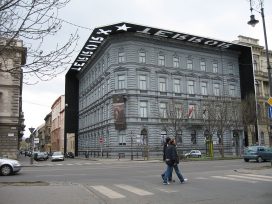Even if the West undertakes no obligations vis-à-vis the Rest, the principles upon which it is built suggest some responsibility, writes Mykola Riabchuk. Ukrainians are particularly wary of the Realpolitik that dominates western dealings with Russia. Whatever one thinks about the “centuries old affinity” between Ukraine and Russia, any policy that downplays the issue of values is fundamentally flawed.
Articles
Read more than 6000 articles in 35 languages from over 90 cultural journals and associates.

As the fog lifted
Literature in eastern central Europe since 1989
After 1989, uncensored editions of many classics of contemporary eastern European literature became available, and numerous authors were discovered for the first time in the West. Meanwhile, a younger generation of writers, their imaginations liberated by events, were quick to respond to the new appetite for understanding the communist past. Katharina Raabe, editor for eastern European literature at Suhrkamp Verlag, surveys some of the most important of these authors and describes German publishers’ role in bringing them to western readers.

“Like the champagne from the bottles in Prague, that’s how the tears came rolling from my eyes! I’m tellin’ ya, if a Czechoslovak had been within reach, I’d’ve licked his ass clean!” A tough-talking Magyar remembers the stirrings of neighbourly affection in ’89.
“Increasing social distance between the poorest and the richest diminishes social cohesion, which in turn means more collective problems and fewer resources for solving all our other collective problems.” Göran Therborn on why inequality matters.
Challenges of freedom
International conference in Krakow
The conference “Challenges of freedom” takes place on 8 and 9 October in Krakow. The event, organized by Villa Decius in partnership with Eurozine, will discuss the essence of ideologies of liberation and the role of ethical values in initiating historical change.

“It is an unnatural but positive development when democracy trains people to believe that, overall, it is better to let the bastard speak.” Former Solidarity activist and journalist Konstanty Gebert talks to Irena Maryniak about censorship post-’89 and anti-Semitism in Poland today.
Designing the margin of feasible bodies
Truths and binary oppositions in the construction of sexes-genders-sexualities
The controversy around the gender of the South African athlete Caster Semenya is by no means unprecedented. As Nuria Gregori and Silvia Garcia Dauder write, the world of sport is a social microcosm that reveals much about the role of assumptions concerning biological sex in a psychosocial logic in which gender identity, sexual orientation or sexual practice exerts maximum authority.
A museum to Tito at his one-time summer residence glorifying the Yugoslav dictator is in stark contrast to a damning new biography, finds Slavenka Drakulic. Yet between the two extremes is an absence of objective history-writing in the former Yugoslavia.

Two books dealing with the state security apparatus in communist Hungary emphasize the extent to which its members, from informants and their handlers up to high-ranking politicians, were subordinate to the Communist Party hierarchy. Clearly, a much wider circle of people than the network of agents were responsible for the disadvantages, and even vilification, suffered by thousands of people.
Postmodern theory can be pretentious and overblown. But a new series of reissues calls for more than the glib rejection characterizing much of the contemporary Anglo-American humanities, writes Nina Power.
The terrorist, the hacker and the financier are the new pirates, taking advantage of the spatial revolution brought about by globalization. Carving out a new geography for themselves, they force legal institutions to change their responses: universal jurisdiction turns every judge into a pirate of the law.
Central Europe's laboratory of freedom
The quest for a media culture in Slovakia
In Slovakia, journalists’ hard won freedom after 1989 was rapidly curtailed by the authoritarian government of Vladimír Meciar. The media rallied again and played a key role in the victory of the opposition in 1998, only to fall victim to legal intimidation and corruption within their own ranks. But although the most serious challenges to press freedom have been seen off, a media culture free of the legacies of the past has yet to develop, writes Martin Simecka.

No one in eastern central Europe suspected that once the fight for independence was won, democracy would become a parody of itself, writes Tomas Kavaliauskas. Open disrespect for the public jars with the ideals of the Baltic Way that existed before and after 1989.
From carbon insolvency to climate dividends
How observing the 2° target may lead to a new global order
If the G8’s goal of limiting global warming to 2°C is to be more than just lip service, radical decisions will need to be taken at the climate change conference in Copenhagen in December. An emissions-trading system based on a national per-capita emissions budget and tied to historical responsibility would offer enormous opportunities to developing countries and provide the key to a new low-carbon global order.
It’s hard to conceive of anything that the art market, worth 20 billion dollars in 2008, hasn’t yet consumed, writes Allesandro Ludovico. Italy as location for the exhibition “Art, Price and Value, Contemporary Art and the Market” is apt, given Italian artists’ unique response to the country’s priceless artistic heritage and the cultural influence that implies.